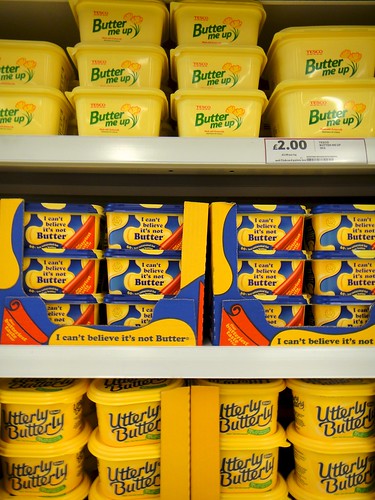There's a traditional oven in our apartment*! Furthermore, cake ingredients are not only readily available but are cheap at the local Tescos mega temple.
Weeeirdd! These yellow butterish products said only what they are not. For baking, I had to be sure it was margarine, so I avoided this array of dubiousness and eventually found a slab of something called "Stork, Perfect for pastry", which said it was 75% vegetable fat. Is that enough? Brownies look OK, fortunately. But what happened to good old margarine?!
*In Japan our only oven is a combi microwave that we brought over from the UK with us. Mostly only rich people have real ovens in Japan.
--
Posted By jules to jules' pics at 8/14/2010 04:07:00 AM

10 comments:
Storkis real margarine, as used by my mother and grandmothers for decades for baking, and they produced some really good cakes and biscuits. In fact I havn't seen anything else like it. SO of course the chocolate brownies turn out well, as well as the cooks skill of course.
All the other 'margarine' is market differentiation stuff designed to convince you that you need to eat margarine with extra healthy additives to make it good for you.
Thanks for the encouragement.
The word "margarine" couldn't be found anywhere - even on the normal margarine. Just fashion or is there a real reason?
You know, I really don't know the answer. Some time in the last 15 years, ie after I stopped eating at my parents because I went to uni etc, they must have taken the word off the packets. But because by then I'd become used to butter on toast and stork for baking I didn't notice at all. I will now get funny looks when I next go into the supermarket, peering at all the margarine tubs.
hhmmmmm
http://www.imace.org/organisation/japan.htm
Hank: Not sure what point you are making. The point of my post was one of contrast between the UK and Japan.
Yes it is still available in Japan, and advertised without shame. I'm just wondering when over the last 9 years it disappeared from the UK shelves.
It's not the complete story, by any means, but these links help paint the picture for the changes noticed.
'Low-fat spreads can be more harmful than butter' from the Independent in 2001.
Better than Butter?, a Nutrition Action Healthletter from 2001.
I can't believe it's not … healthy!, from the Guardian this year.
Some of those "yellow butterish products", or similar, may be suitable for cooking. It should say on the pack if they are unsuitable for cooking with (IIRC).
The Dairy Council publish a pdf containing what's in the various types of butter/spread.
Sorry, meant to add more; looking country by country, I think the word 'margarine' has been associated with hydrogenation that produces trans-fats, which turn out to be so unhealthy --- the newer products with less or no trans fats get a different name in marketing.
Oh...
Yes I remember trans-fat stories, and recall seeing that my Pringles packets started to advertise their lack of same (seems there is an awful lot of omission advertising!). But I didn't really think anyone had actually taken it seriously... In fact I rather thought that the "it was good for you last decade, but now it's bad for you" thing might make people realise that there is really no point worrying about it...
Chuckle. Well if some time you want tomake time to look at this, the nutrition industry has PR much like the fossil fuel industry.
'oogle scholar for "trans fats" and look at the slow progress; likely the stuff now banned in for example California is available cheap elsewhere. The health info has been convincing for 20 years.
Aside, some of the military nutrition people have gone public -- to much opposition. This an all-day video, but if you skip to the second and third panelists you get the basics, including amazing comparisons to the Japanese diet and health
http://videocast.nih.gov/summary.asp?file=15353
8:45 – 9:15am Dietary Omega-3 and Omega-6...
William E.M. Lands, Ph.D.
Volunteer, National Institute on Alcohol Abuse and Alcoholism, NIH
9:15– 9:45am What, When, and Where do Deployed Soldiers Eat?
First Sergeant (Retired) Rick Haddad
(shorter answer--they eat cheap non-fresh commodity food from the military, and unhealthy fast food the soldiers buy for themselves at franchise operations available inside military bases)
Looks like the US military is taking on the food industry both because of soldiers' health and because recruiting is failing --more and more teenage boys are too unhealthy to accept into the military.
Keep eating your seaweed ...
http://www.annals.org/content/152/3/194.3.full "the science for eliminating exposure is “rock solid."
The food oils industry is amazingly similar to the fossil oils industry; a history of cheap sources with costs that were externalized and found belatedly, then decades of lobbying against the science, and here we are.
Post a Comment